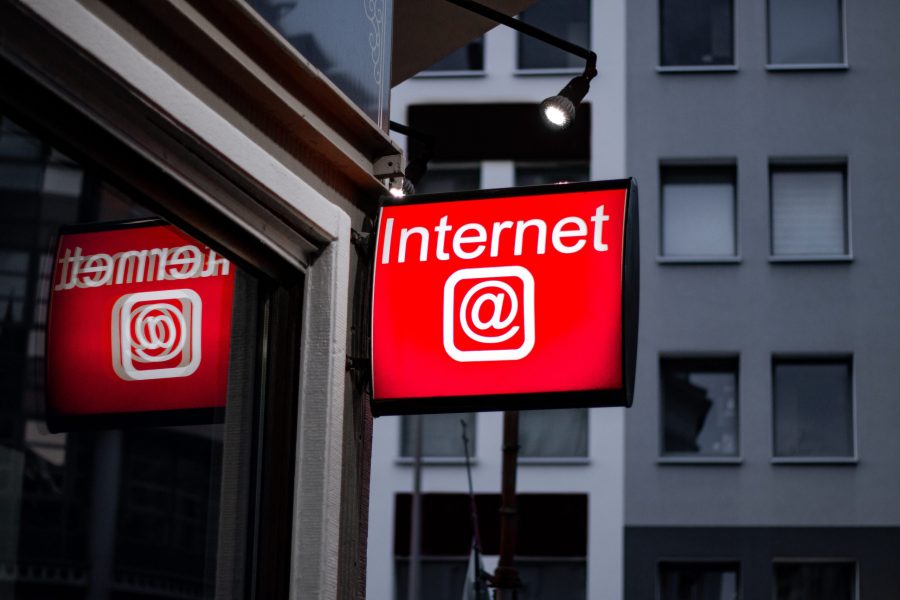Many are facing Internet issues during the coronavirus outbreak. Just today, news has broken that Virgin Media is experiencing network outages. And that’s by no means the only network experiencing issues. Some users have even reported their broadband capacity halving. This isn’t surprising with the swelling demand as more and more people switch to remote work in a move toward social-distancing or self-isolation. Even Whatsapp and Facebook have been affected, with their servers being described as having gone into ‘melt down’, and Zuckerberg forced to increase their capacity.
The stickiness of the situation becomes clearer when you think of the UK’s Internet infrastructure. While countries like Korea and China have heavily invested in fibre and 5G networks, much of the UK depends on local networks of copper wires. These are far less reliable. In fact, according to the Financial Times, more than 80% of Korea and Japan’s fixed line connections are high-speed fibre. In Britain, only 10% of fixed line connections qualify. That makes us one of the lowest in the OECD.
A global crisis
Of course, looking at the bigger picture, connectivity issues don’t seem so important. People’s healths and livelihoods are at risk. Not being able to get online isn’t on the same scale. But for people who are having to work from home, the inability to do so efficiently could also compromise their livelihood. If there’s a way to alleviate the pressures being put on communication channels, it can only be a good thing. Particularly when you consider that users in Spain have already been asked to ration their Internet usage. Anything we can do to cut down on how much bandwidth we use leaves more for everyone else. Plus, dealing with frustrating Internet issues during the coronavirus outbreak, which is already such a distressing time, is an added source of stress which nobody needs.
We are currently facing an unprecedented global crisis. All over the world, people are totally changing the way they live. The Prime Minister has recently urged Britons to avoid the office, as well as places like pubs and restaurants. So of course, more of us than ever are looking for ways to work efficiently from home during the coronavirus pandemic. But many of the communication tools which we might turn to rely on a strong Internet connection and use a considerable amount of broadband. That’s why for many newly-remote workers facing issues with Internet during the coronavirus outbreak, conference calling might be a better alternative.
Why might there be Internet issues during the coronavirus outbreak?
The current situation would certainly fall more into the category of a health crisis than a technological one. Second to its impact on public health is probably the consequences it will have for the economy. Even international relations are likely to be impacted, with debates sparking about isolationism, globalization, border-control and more.
These are doubtless bigger issues, likely with long-lasting and far-reaching impacts that we can’t yet understand. Nevertheless, there are also smaller and more immediate effects to consider. One of these is the additional demand that will likely be placed on Internet providers.
Remote working
Particularly notable, especially for many current conference callers, is that switch to working from home. As we’re encouraged to avoid non-essential contact and travel, commuting on public transport to busy offices in city centres doesn’t seem wise.
Still, luckily many people remain fit and healthy. While they can’t travel to work, they can, in theory, work just as well. So lots of workers are finding ways of continuing business as usual from home. But business as usual won’t, for most people, require the same amount of Internet as everyday working life. While most of us do depend on the Internet in our day-to-day professional lives, we don’t always need it just to check in with our team.
But social distancing means that our colleagues are no longer a couple of desks away. Instead, we’re turning to collaboration tools to stay in touch with our teams and on top of our workloads. Things like video calls, screen sharing, cloud-based document editing and sharing platforms are doubtless really valuable for many. But they also all require a strong Internet connection.
Online shopping
Another area which has been staggeringly impacted by developing news regarding the coronavirus outbreak has been shopping. In particular, people have been buying groceries on an unheard-of scale. Fearing food-shortages and quarantines, people have been stockpiling food.
But as the push to social distance has become stronger, and as supermarket stocks have depleted, people have also been reluctant to go shopping. That’s meant a huge up-tick in online shopping. Such has been the demand that Ocado no longer accepts new customers. The online grocer also had to implement a queuing system for visitors, with wait-times to even view the site stretching hours. This followed reports of the website barely working at all, with error messages or pages explaining that their capacity had been exceeded appearing, or the website not loading at all.
Other supermarkets have faced difficulties too. Some of the biggest retailers have now limited how many items each customer can buy – and not only on those in-demand staples.
Gaming and streaming
Of course, even (or especially) in times of crisis, people need down-time and entertainment. Facing months of potential lockdown, we’re all thinking about how to stave off boredom and loneliness as we self-isolate from COVID-19.
Two of the most popular home-entertainment activities also need a strong Internet connection: watching films and television, and gaming. And both are seeing huge increases in usage as people head into self-quarantine.
The largest PC gaming platform, Steam, recently Tweeted to announce they’d broken their online user record of 20 million. At the time of the Tweet, there were a huge 6.2 million people using the platform. The Tweet itself assigned this surge to people staying home amidst the coronavirus outbreak.
There have also been additions to the usual binge-worthy series and blockbuster movies in the streaming world. With mass gatherings being discouraged, if not banned, many artists are choosing to live-stream performances to audiences.
Alleviating demands on the Internet
These are all great and necessary uses for the Internet. We do need to continue eating. Supporting artists, theatres and the arts in general is vital. And there are many professional tasks which will require online collaboration tools.
But one thing that might not be so important is video conferencing. Generally, the words are more crucial than the visual elements of a meeting. As you stay in touch with your team, do you really need to be reminded what they all look like? And there are probably many among us for whom one of the plus-sides of working from home will be newly-viable option of loungewear.
As demand on the Internet swells, you might find it less reliable, less smooth, and less speedy than usual. Considering alternatives to video conferencing is almost definitely a good idea.
Conference calls with a dial-in number
One option is to use teleconferences which don’t depend on the Internet. Look for a provider whose calls are accessed using a dial-in telephone number – like WHYPAY?. Ideally, you want a dial-in number which is free to call. Here again, WHYPAY? provides the perfect example.
To access any of our conference call rooms, users call a number which begins with 03. You can find out more about 03 numbers in this blog post, but it’s quite simple. According to Ofcom rules, calls to 03 numbers have to be included in callers’ bundled minutes. That means that as long as your phone contract has minutes available, the call doesn’t cost you a penny.
The other great thing about choosing a provider with a dial-in number is that not only do you not need Internet, you don’t need any specialist equipment either. If this is your first experience of remote work, you probably don’t have loads of spare conference call phones kicking around or set up at home. In fact, your job might not require much technical expertise at all, let alone technology. With WHYPAY? conference calls, all you need is a phone that can place calls – something we’ve been doing for over a hundred years! It’s an accessible and familiar way for all of your staff to stay in touch, and avoid facing Internet issues during the coronavirus outbreak.
Create a FREE TeleconferenceHow much Internet does video conferencing use?
Internet usage is definitely variable, depending on factors like the video camera. An indicative example might be an HD720 resolution camera – which is what you would find on a MacBook. You would spend on average a bandwidth of 2Mbps. One minute of video conference would use 15 MB (60 seconds x 2Mbps / 8). That means in a one hour video call, you would use 900 MB per person.
How much data does an audio conference use?
Many calls now use bandwidth rather than being connected over the mobile network. Even if you’re calling a telephone number – like WHYPAY?’s 03 dial-in numbers – the call might actually happen over WiFi or over a SIP Trunk. That makes it quite simple to compare how much bandwidth an audio meeting would use versus a video conference.
A good quality SIP call would be transmitted at around 100 Kb per second. In a minute, the call would use 0.75 MB. In an hour, that comes to just 45 MB per person. That’s twenty times less data than a video call!
Choose conference calls to avoid Internet issues during the coronavirus outbreak
Whether you want to stay in touch with work, or you’re finding ways to fight loneliness during self-isolation, choosing conference calls lets you avoid Internet issues during the coronavirus outbreak.
You might find that this makes for a smoother and less frustrating experience. As they require less data to be transmitted, conference calls are less likely descend into endless buffering than video calls.
You’ll also be alleviating the high demand placed on Internet. That should allow people to make use of it in other vital ways. From looking up symptoms to keeping entertained, buying food to sending documents to colleagues, there are all kinds of reasons to be online as we self-isolate.
Weekly meetings and casual catch-ups don’t usually require a visual element. You can help avoid any Internet issues during the coronavirus by opting for a simple conference call!
To get started, simply click on the button below or head to the WHYPAY? homepage.
Create a FREE TeleconferenceAnd if you’re new to the world of conference calling, there’s lots of guidance available: just check out our blog and our helpdesk. You can also reach out with any questions via live chat on the bottom right corner of the website, email ([email protected]), or telephone (033 3443 3366).
Update 24 March 2020: Unfortunately, due to network capacity dimensioning we are no longer able to offer 3 months free on the Pro plan. A tenfold increase in demand for the custom 03 numbers offered on the Pro plan has outstripped our ability to supply these. The new discount codes MON3 and ANN3 will still apply for 3 months free on our Plus plan.




